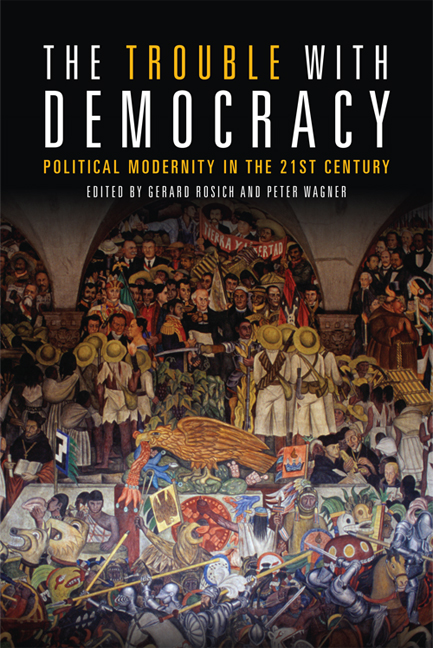Book contents
- Frontmatter
- Contents
- Acknowledgements
- List of Contributors
- 1 Introduction: Re-Interpreting Democracy for Our Time
- 2 Autonomy in and between Polities: Democracy and the Need for Collective Political Selves
- 3 Rethinking ‘Modern’ Democracy: Political Modernity and Constituent Power
- 4 Democratic Surplus and Democracy-in-Failing: On Ancient and Modern Self-Cancellation of Democracy
- 5 Setbacks of Women's Emancipation (Condition, Consequence, Measure and Ruse)
- 6 Political Modernity, Democracy and State–Society Relations in Latin America: A New Socio-Historical Problématique?
- 7 Communitarian Cosmopolitanism: Argentina's Recuperated Factories, Neoliberal Globalisation and Democratic Citizenship. An Arendtian Perspective
- 8 Middle-Classing in Roodepoort: Unexpected Sites of Post-Apartheid ‘Community’
- 9 Democracy and Capitalism in Europe, Brazil and South Africa
- 10 From Realism to Activism: A Critique of Resignation in Political Theory
- 11 The World as We Find It: A Suggestion for a Democratic Theory for Our Times
- 12 Epilogue: Democracy as Capacity for Self-Transformation
- Index
5 - Setbacks of Women's Emancipation (Condition, Consequence, Measure and Ruse)
Published online by Cambridge University Press: 05 September 2016
- Frontmatter
- Contents
- Acknowledgements
- List of Contributors
- 1 Introduction: Re-Interpreting Democracy for Our Time
- 2 Autonomy in and between Polities: Democracy and the Need for Collective Political Selves
- 3 Rethinking ‘Modern’ Democracy: Political Modernity and Constituent Power
- 4 Democratic Surplus and Democracy-in-Failing: On Ancient and Modern Self-Cancellation of Democracy
- 5 Setbacks of Women's Emancipation (Condition, Consequence, Measure and Ruse)
- 6 Political Modernity, Democracy and State–Society Relations in Latin America: A New Socio-Historical Problématique?
- 7 Communitarian Cosmopolitanism: Argentina's Recuperated Factories, Neoliberal Globalisation and Democratic Citizenship. An Arendtian Perspective
- 8 Middle-Classing in Roodepoort: Unexpected Sites of Post-Apartheid ‘Community’
- 9 Democracy and Capitalism in Europe, Brazil and South Africa
- 10 From Realism to Activism: A Critique of Resignation in Political Theory
- 11 The World as We Find It: A Suggestion for a Democratic Theory for Our Times
- 12 Epilogue: Democracy as Capacity for Self-Transformation
- Index
Summary
One does not easily escape a linear representation of history. The figure of emancipation suffers from the image of progress, the sense of assured conquest, the idea of access as a continuous path. This linearity affects the thought of emancipation with a modern, democratic value, that of the new history of freedom and equality.
However, the affirmation of emancipation is always illuminated by a precise moment, the passage from one state to another, a temporal rupture. This passage can appear natural, as the passage from child to adult. It is, however, socially structured by the fixed legal, civic or sexual age. Citizenship, criminal responsibility, marriage age, sexual orientation, all of these potential individual states have variable age thresholds depending on the country, and may vary as well inside each country. But a threshold there is. Images of progressive continuity on one hand, and fixed thresholds on the other, are thus the two somewhat opposed markers of a spontaneous representation of emancipation. Admittedly, we know now that we must add, by necessity, the idea of democratic incompletion, the bitter taste of incomplete conquests, of fragile, even reversible, rights. However, the idea of emancipation merits, again and always, to be understood in all of its primary force. When it appears that the notion of progress is old-fashioned, the idea of democratic incompletion has lost the strength of its conviction; what remains is the importance of emancipation, and its subtext, the image of rupture.
Contemporary political emancipation has therefore been patterned on the model of individual emancipation, borrowing from it the corollaries of progress and transformation. The times to come will always be the best; a particular moment, a passage, threshold or rupture, will often be necessary. Examples include the emancipation of peoples and the future revolution (or ‘grand Soir’) to prepare, or the emancipation of nations and the colonies’ proclamation of independence, or national revolution. The emancipation of women is the third component of the trilogy ‘people, race, sex’ (or ‘nation, race, sex’) which structures the contemporary era; emancipation and liberation being stackable distinguishable terms.
- Type
- Chapter
- Information
- The Trouble with DemocracyPolitical Modernity in the 21st Century, pp. 110 - 120Publisher: Edinburgh University PressPrint publication year: 2016



